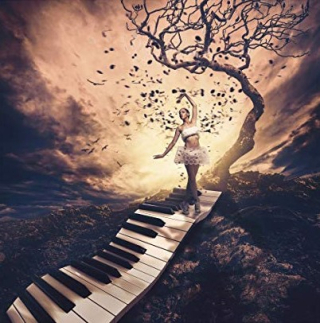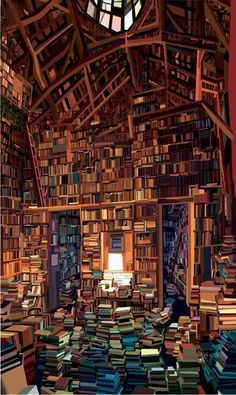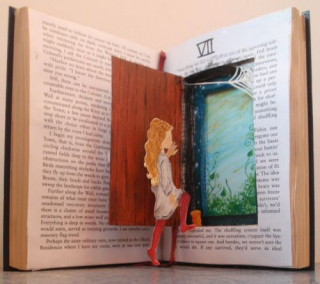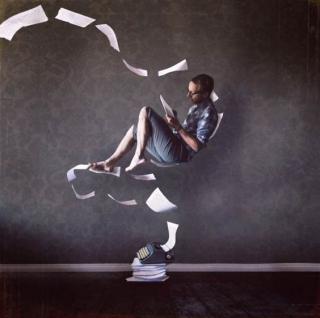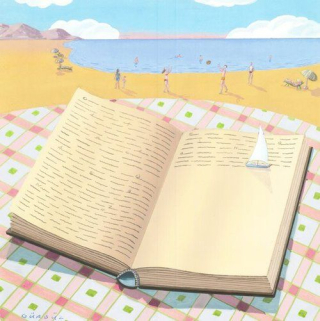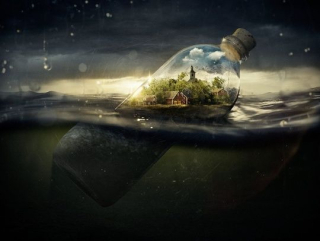Rob Bignell's Blog, page 153
January 15, 2020
"As a writer you ask yourself to dream while awake." - Aimee Bender
Professional Book Editor: Having your novel, short story or nonfiction manuscript proofread or edited before submitting it can prove invaluable. In an economic climate where you face heavy competition, your writing needs a second eye to give you the edge. I can provide that second eye.
January 14, 2020
"A writer's keyboard is a piano, where they create silent music sung in readers' voices." - Raymond Esposito
Professional Book Editor: Having your novel, short story or nonfiction manuscript proofread or edited before submitting it can prove invaluable. In an economic climate where you face heavy competition, your writing needs a second eye to give you the edge. I can provide that second eye.
January 13, 2020
Which is best: Writing at home or a public space?
One key  to being a productive and creative writer is determining which place ��� home alone or in a public place like a library, coffeeshop or cafe.
to being a productive and creative writer is determining which place ��� home alone or in a public place like a library, coffeeshop or cafe.
Famous authors differ in their preference. Franz Kafka wrote at home but only when his entire family had left. Emily Dickinson rarely left her house and later in life her bedroom. Other writers liked the hustle and bustle of coffee shops and parks. Jean Paul Sartre and Simone de Beauvoir often spent hours at a time writing their novels and essays in Paris cafes.
And some select truly odd places to write. Vladimir Nabokov, for example, liked to write in the backseat of his car as his wife drove.
So where���s the best place to write for you to write ��� alone in your home or at a public place (We���ll presume you���re not an oddball like Nabokov)?
At first glance, each place is fraught with perils to your writing time.
Writing at home usually means distractions galore, such as wondering if the laundry is done, seeing the dirty dishes in the sink while up your coffee mug, or realizing you really should vacuum the floors as gazing over your laptop to think through the wording of your next sentence. In short, your home gives the writer in you a thousand reasons to procrastinate.
Writing in public often means a loud, chaotic noise, as people talk and laugh or an occasional plate is dropped. And then there���s the nauseating perfume of the lady sitting near you and in winter the cold rush of air that freezes you every time someone opens the door.
Considering this, it���s surprising that any writing gets done by anyone at all.
But of course it does.
That���s because most writers thrive in one environment or the other. They���re able to focus and feed off of either the quiet of home or the clamor of a public place. A few even are able to write in both situations.
To find which works best for you may mean experimenting with each location a little. It also may mean making a few adjustments.
Tips on writing at home
To be a more productive and creative writer in your home, you may want to:
��� Do housework in brief breaks ��� To avoid eye strain, you should quit looking at your computer screen every 10-15 minutes. Keep those breaks to 30 seconds (set a timer if you must) to fold a few clothes, wash a couple of dishes, and to set the bleach and sponge on the bathroom sink. Then get back to writing.
��� Refocus the view from your workspace ��� Turn your desk or place it in a spot where you can���t see anything else in the house. For example, the view from my work desk is the tree-lined backyard from a large picture window. The green leaves and singing birds are peaceful but not distracting. Fill a carafe with coffee or tea so you don���t need to get up for it.
��� Turn off everything ��� That means no television, no cell phone, no window opened to your email (even if it���s minimized)...maybe even no music playing in the background. Don���t give these distractions an opportunity to eat away your writing time.
Tips on writing in public space
To be a more productive and creative writer in a public space, you may want to:
��� Select the right atmosphere ��� Not all coffeeshops, cafes or libraries look alike. Some are very stark with postmodern furniture while others are quite homey. Some attract mainly college kids while others are for the office crowd. Some are loud spots where people mainly visit while others are hushed and full of readers and studiers. Some of these moods and tones will nourish while others will quash your creativity.
��� Go when those places aren���t busy ��� If you like the liveliness of a coffee shop or cafe but don���t want it too lively, then write when there are only a few customers. Every spot is a little different in its customer flow, so you may need to go at various times to see what works best.
��� Find a spot that���s tucked away ��� Just as you would refocus your workspace when writing from home, find a table that���s not next to a major aisle for customers. One with a great view that keeps you from looking at other customers is optimal. A back corner is a good idea, as it keeps people from glancing over your shoulder at what you���re writing.
��� Don���t sign into the local Wi-Fi ��� The temptation to check your email and look at Facebook will be just too great. Turn off your cell phone while you���re at it too.
��� Wear earbuds ��� If the background buzz gets too loud while you���re in the writing groove, don some earbuds to block out the noise. You may even listen to music turned down low enough that it���s an additional sound barrier but doesn���t distract you.
Professional Book Editor: Having your novel, short story or nonfiction manuscript proofread or edited before submitting it can prove invaluable. In an economic climate where you face heavy competition, your writing needs a second eye to give you the edge. I can provide that second eye.
January 12, 2020
"A man will turn over half a library to make one book." - Samuel Johnson
Professional Book Editor: Having your novel, short story or nonfiction manuscript proofread or edited before submitting it can prove invaluable. In an economic climate where you face heavy competition, your writing needs a second eye to give you the edge. I can provide that second eye.
January 11, 2020
"[The] privilege of being a writer is being able to say, 'Open your mind to me and I'll take you to another world.'" - Alexei Maxim Russell
Professional Book Editor: Having your novel, short story or nonfiction manuscript proofread or edited before submitting it can prove invaluable. In an economic climate where you face heavy competition, your writing needs a second eye to give you the edge. I can provide that second eye.
January 10, 2020
"A good novel tells us the truth about its hero; but a bad novel tells us the truth about its author." - G.K. Chesterton
Professional Book Editor: Having your novel, short story or nonfiction manuscript proofread or edited before submitting it can prove invaluable. In an economic climate where you face heavy competition, your writing needs a second eye to give you the edge. I can provide that second eye.
January 9, 2020
"A blank piece of paper is God's way of telling us how hard it is to be God." - Sidney Sheldon
Professional Book Editor: Having your novel, short story or nonfiction manuscript proofread or edited before submitting it can prove invaluable. In an economic climate where you face heavy competition, your writing needs a second eye to give you the edge. I can provide that second eye.
January 8, 2020
"Inspiration is a guest that does not willingly visit the lazy." - Pyotr Tchaikovsky
Professional Book Editor: Having your novel, short story or nonfiction manuscript proofread or edited before submitting it can prove invaluable. In an economic climate where you face heavy competition, your writing needs a second eye to give you the edge. I can provide that second eye.
January 7, 2020
"If the writing is honest it cannot be separated from the man who wrote it." - Tennessee Williams
Professional Book Editor: Having your novel, short story or nonfiction manuscript proofread or edited before submitting it can prove invaluable. In an economic climate where you face heavy competition, your writing needs a second eye to give you the edge. I can provide that second eye.
Amazon.com Widgets
January 6, 2020
How to use scene breaks in novels, short stories
Often 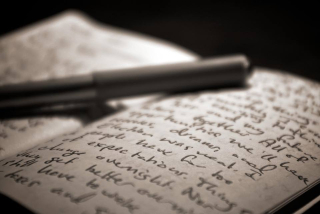 in novels and long short stories, a scene break is needed. A scene break is a visual marker that lets readers know the setting has changed.
in novels and long short stories, a scene break is needed. A scene break is a visual marker that lets readers know the setting has changed.
The scene break is important as it skips over the unimportant stuff in the story. For example, if our protagonist secret agent learns that another character in a different location has information he needs, there���s no need to show him driving to that site, stopping off for dinner along the way, or filling his sports car with gas afterward. Instead, just jump to the point in the story where he���s already arrived and is scoping out the locale to find a way to sneak in.
A scene break can be visually created by simply placing a blank line or three centered asterisks between the two scenes, as in:
���It was Gravin ��� Gravin was the one who smuggled the diamonds,��� the scar-faced man gasped, as the cord around his neck tightened.
Ryan loosened his hold on the cord and gently set the scar-faced man���s head against the concrete floor. Then Ryan kicked the man���s head, pulled out his Glock G-43, and pressed his thumb against the trigger.
***
As Ryan���s head peeked above the shrubbery, his eyes scanned Gravin���s compound for an easy entry.
Dispensing with the here-to-there action ensures you keep the story���s level of suspense high. Readers are savvy enough to know that time has passed and could care less what the main character did during the interim.
A scene break can be used for other dramatic purposes than showing a change in setting, though. For example:
Jack wished they'd move on; he didn't know how much longer his sweaty hands could hold on to the cliff's edge. And then the dirt beneath his thumbs crumbled.
***
Sarah wrung her hands as gazing at the sunlit cliff above. Jack never was late.
In this case, the scene break occurs when the characters that the narration focuses on changes. (One scene is about Jack, and the other is about Sarah.) or when the point of view of view changes. (If Sara also was hanging over cliff with Jack and the narration switches from Jack's to Sara's perspective, then a scene break also is needed.)
The three centered asterisks aren���t the only way to show a scene break. Other symbols can be used; for example, a novel set at a marina might use a centered sailboat rather than asterisks. Or you may simply place a blank line between the two scenes; this can be problematic, however, if already using a blank space rather than indentations to mark the end and start of paragraphs, as is often done in ebooks.
Professional Book Editor: Having your novel, short story or nonfiction manuscript proofread or edited before submitting it can prove invaluable. In an economic climate where you face heavy competition, your writing needs a second eye to give you the edge. I can provide that second eye.


